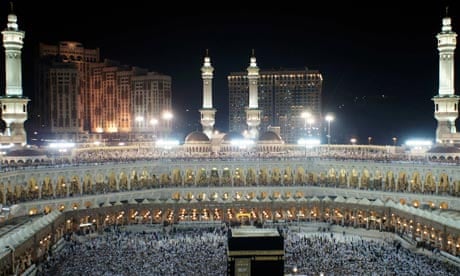Explosives detectors are to be installed at the entrances to the Holy Mosque in Mecca as the Saudi authorities boost security around the city's holy sites.
Around 180 people work on a shift pattern to man the gates leading to the Masjid al-Haram, which surrounds the Ka'aba, the black granite cube that Muslims turn to when praying.
But there are no other measures in place to screen pilgrims for weapons, explosive devices or other banned items, although there are more than 700 cameras tracking them for possible theft, pickpocketing and other criminal or immoral activity.
Lieutenant Colonel Fawaz al-Sahafi, who heads the security team at the mosque, told the Saudi Gazette plans to fit "sophisticated metal and explosive detectors" at the multiple gates were under way.
He also said there were proposals to monitor pilgrims' movements and have plain-clothes officers mingling with worshippers to stop them from carrying unauthorised foodstuffs into the mosque.
Another security official, Lieutenant General Saeed Bin Abdullah al-Qahtani, said cameras at pilgrims' residential buildings, traffic initiatives and crowd management plans would improve safety inside and outside the Grand Mosque.
There is a ban on private cars carrying pilgrims entering Mecca, and there will be greater intervention from guards to ease congestion and jostling.
The Saudi authorities have revamped a key element of the Hajj to minimise the potential for stampedes and expedite the evacuation of worshippers, but similar initiatives have yet to materialise at other sites in Mecca.
Islam's holiest city has not experienced terrorist activity since 1979, when hundreds of people died following an armed takeover of the Grand Mosque, with overcrowding proving to be more of a threat in recent years.
At any one time, almost 1 million pilgrims can fit into the Grand Mosque. It covers almost one-third of a square kilometre but, in the coming days, King Abdullah will lay a foundation stone marking an expansion project to accommodate more believers.
Around 4 million Muslims visit Mecca to perform the Hajj, the Islamic pilgrimage, while millions more go there throughout the year.
